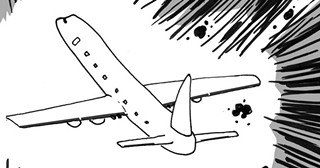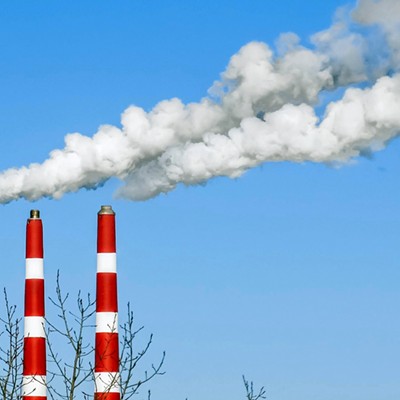These days I don't go past Toronto. Every time I leave the province it's a crisis of faith. No matter the road you take, travel is hard on the environment. Unless you count military air strikes as legitimate travel, cruise ships are the worst. They're wasteful, polluting beasts that shed their carbon entrails as they go. Any large boat not running on wind emits far more per passenger-kilometre than a typical plane.
But as a whole, air travel is the biggest threat. If you're on a full plane you're responsible for about half the carbon emissions per kilometre as some dude riding shotgun in his best friend's ride. But when you account for non-carbon greenhouse gas emissions, your contribution to the melting ice caps, per kilometre, is worse than if you were driving. Moreover, you're likely flying as many kilometres in a day as dude on the ground is going each year in his car. It's the vast distances we travel that make flying unsustainable.
In total, air travel contributes about five percent of all greenhouse gas emissions. But air traffic is growing unabated---five percent a year since the late '90s. It's the fastest growing source of greenhouse gases. By 2030 it'll be the biggest source.
In his influential 2006 book Heat, George Monbiot calculated that if air traffic keeps growing at this rate, meeting emissions reductions targets will be mathematically impossible---by 2050 planes will contribute 134 percent of total allowable emissions, even with hopeful improvements in fuel efficiency.
While innovation may prolong our jet- setting ways, there is no permanent techno-fix. Airplanes use the same basic engine design they did in 1947. Many of the original 747s from the 1970s are still in the air. While airplane manufacturers speculate on fuel alternatives and engine design breakthroughs, the practical implementation of these developments is decades away at best.
A slow train remains the most efficient (roughly tied with buses) way to travel, unless you consider sulfur dioxide, which causes acid rain; trains emit up to seven times as much of it as planes per passenger-kilometre. And if your power source is linked to Colombian coal your environmental impact is immense. Once a train moves faster than 200 kilometres an hour, fuel efficiency goes out the steam-stack.
Monbiot argues that to survive this century, humanity needs to reduce its greenhouse gas emissions at least 90 percent. We'll come nowhere near that target if we keep criss-crossing the globe. Despite all the international agreements to curtail greenhouse gas emissions, few have shown any concern with all this flying.
Government response to increased air traffic has generally been expanded airports, more runways and promotional campaigns to attract tourists. It's like trying to control a vermin population by leaving food out for the newborns.
Government inaction is no surprise---almost no one is demanding reduced air travel. Nations can crank up flight capacity because international emissions reduction agreements exclude international flights---it's too dang hard to figure out which country takes on which portion of the emissions.
Monbiot's theory explaining the "moral dissonance about flying" rings true. "It is rather harder to contemplate a world in which our own freedoms are curtailed," he writes. Taking the bus to work is one thing, but never seeing Europe? Unthinkable. Especially now that we've accumulated what Monbiot calls "love miles"---loved ones in faraway places, necessitating further flights to important events throughout their lives.
Staying close to home is unimaginable in this part of the world, where most of us have had the privilege of flying. But the people most affected by climate change don't live here; they live where most people never see the inside of a plane.
Even the greenest of my generation have taken world travel for granted. It's our education---it helps us think globally so we can act locally. But if we're serious about keeping this species going, we'll heed Monbiot's frank words: "If you fly, you destroy other people's lives."
Chris Benjamin is the author of the Canada Reads long-listed novel Drive-by Saviours











